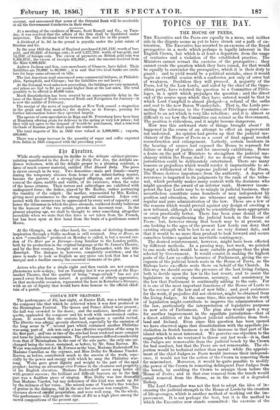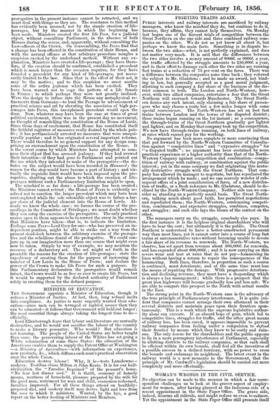TOPICS OF THE DAY.
THE HOUSE OF PEERS.
THE Executive and the Peers are equally in a mess, and neither side in the dispute seems as yet to have struck out a path of ex- trication. The Executive has resorted to an exercise of the Royal prerogative tive in a mode which perhaps is legally inherent in the English Crown, but which is at least a departure from the of centuries and a violation of the established practice. usage Ministers cannot retract the exercise of the prerogative ; they cannot evade the question which they have raised, for that would be equally to surrender the prerogative which it is their duty to guard ; and to yield would be a political mistake, since it would begin an eventftil session with a confession pot only of error but of weakness. , Doubtless they will proceed. A majority of the Peers, led by the Law Lords, and aided by the chief of the Oppo- sition party, have referred the question to a Committee of Privi- leges, in a spirit which prejudges the question ; and the direct end of the course upon which they have entered would be that to which Lord Campbell is almost pledged—a refusal of the oaths and seat to the new Baron Wensleydale. That is, the Lords pro- moting the reference to the Committee of Privileges stand com- mitted to an act which is very, like rebellion • and it is almost as difficult to see how the Committee can retract as the Government. The position is ridiculous, and it might become dangerous. How was this awkward state of things brought about ? It happened in the course of an attempt to effect an improvement not undesired. An opinion had grown up that the judicial ma- chinery of the House of Peers as a court of final appeal needed reconstruction and enlargement. Latterly, certain incidents in the hearing of causes had exposed the House to reproach for failure or delay of justice and for unseeml exhibitions. Hence a desire on the part of Ministers to strenAcz ma-
chinery within the House itself ; for no esign of removing the jurisdiction could be deliberately entertained. There are many reasons or prejudices which would render it impracticable to at- tempt a withdrawal of the supreme judicial power of the Peers. The House derives importance from the authority. A degree of reverence is imparted to its judgments by the rank of the tribu- nal, which probably makes many content with the decisions who might question the award of an inferior rank. However incom- petent the Lay Lords may be to mingle in judicial business, they nevertheless constitute some hundreds of men independent by position and education who are witnesses and sponsors for the regular and pure administration of the law. These are a few of the reasons which would prevail against any design of erecting a new tribunal, although it might be scientifically more appropriate or even practically better. There has been some denial of the necessity for strengthening the judicial bench in the House of Peers : but, however strong that bench may be at present, no one looking to the ages of the present Law Lords can deny that existing strength will be lost to us at no very distant date, and that it would be no more than prudent to look forward and secure ourselves betimes against an inevitable contingency. The desired reinforcement, however, might have been effected by different methods. In a passing way, last week, we pointed to one mode which would be more suitable perhaps than the plan
selected by Government. It would consist in making the highest posts of the Law ex-officio baronies of Parliament, giving the oc- cupants of the judicial bench seats in the House of Peers, as the Bishops have ex-officio seats there on behalf of the Church. In this way we should secure the presence of the best living Judges,
both to decide upon the law in the last resort, and to assist the legislators in securing clearness, accuracy, and consistency in the law that Parliament is continually adding to the code. For it is one of the most important functions of the House of Lords to be the reviser of the law and of new bills ; and good assistance for the work, if prejudice did not obstruct, might be obtained from the living Judges. At the same time, this assistance in the work of legislation might contribute to improve the administration of the law, particularly the interpretation of legislative purposes in new acts of Parliament. The plan also would open a way for another improvement in the appellate jurisdiction—that of -liouse of Peers ; and in that case removal from the bench would entail removal from the House, as in the case of a degraded Bishop.
The Lord Chancellor was not the first to adopt the idea of in- creasing the judicial strength in the House of Lords by the creation of life-peerages, which is another method of working out the im- provement. It is not perhaps the best: but it is the method to which the Executive now stands committed : the exercise of the prerogative in the present instance cannot be retracted, and we must deal with things as they are. The resistance to this method has evidently been aroused, not by the simple creation of life- peerages, but by the manner in which the beginning has been made. Ministers created the first life Peer, for a judicial object, without consulting Parliament, in the absence of both Houses during the recess, and, apparently, without consulting the Law-officers of the Crown. On reassembling, the Peers find that a change has been effected in the constitution of their House, and with the natural offence at that arbitrary procedure mingles a suspicion excited by the underhand method. Without any ex- planation, Ministers have created a life-peerage ; they have there- fore, if the creation should be confirmed, established a precedent which is much larger than the occasion requires, for they have founded a precedent for any kind of life-peerages, not neces- sarily limited to the law. Since that is the effect of their act, it may be the motive ; and to this suspicion we must ascribe some of the active jealousy which has been excited. They have been warned not to copy the pattern of a life Senate in France ; to which perhaps they were not greatly inclined. Were the design to innise into the House any metaphysical re- finements from Germany—to lend the Peerage to advancement of practical science and art by elevating the associates of high per- sonages into Peers, this unexplained precedent would. open the door. Now, whatever may have been the case at times of great political excitement, there was in the present day no movement, no thought of remodelling the constitution of the House of Lords. Since those days of excitement, that House has constituted itself the faithful registrar of measures really desired by the whole pub- lic; it has pertinaciously arrested no measures that were unequi- vocally popular ; and it has originated several important reforms. There would therefore be no general support for any design com- prising an encroachment upon the constitution of the House. It is the covert course by which Ministers have attempted to com- pass their object that has aroused jealousy. If they had avowed their intention—if they had gone to Parliament and pointed out the use which they intended to make of the prerogative—the de- bates on the subject would have been recorded in Hansard; the reason for the step would have become a part of history ; and vir- tually the requisite limit would have been imposed upon the pre- rogative, shutting out the abuse to which the creation of life- peerages without such a Parliamentary limitation might be open.
The mischief is so far done : a life-peerage has been created ; the Ministers cannot retract ; the House of Peers is evidently re- solved not to sanction the larger precedent which may have been contemplated while the sole ostensible object was to infuse a lar- ger share of the judicial element into the House of Lords. Al- ready we know the whole case ; we foresee the course of the pro- ceeduigs in the Committee of Privileges ; we must doubt whether they can estop the exercise of the prerogative. The only practical course open to them appears to be to correct the error in the course that Ministers have taken—that is, to indicate the limitation. Perhaps some Peer—Lord Grey for one—who has preserved an in- dependent position, might be able to strike out a way from the present dead-lock between the arbitrary exercise of the preroga- tive and the rebellious denial of the prerogative. We could con- jure up in our imagination more than one course that might even now be taken. Simply by way of example, we may mention the recourse of a declaratory act. The act might set forth in the preamble the reasons for the creation of life-peerages ; state the expediency of creating them for the purpose of increasing the i number of Law Lords in the House of Peers ; and declare the power of the Crown to make life Peers for such a purpose. By this Parliamentary declaration the prerogative would remain intact, the Crown would be as free as ever to create life Peers, but it would be supported by the declared authority of Parliament solely in creating them for the defined purpose.



























 Previous page
Previous page